#Harold Dieterle
Text
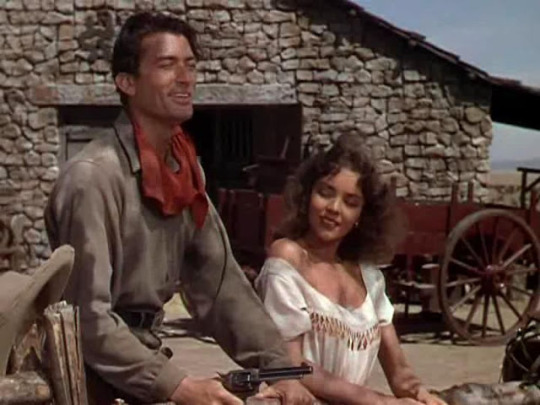
Gregory Peck and Jennifer Jones in Duel in the Sun (King Vidor, 1946)
Cast: Jennifer Jones, Gregory Peck, Joseph Cotten, Lionel Barrymore, Herbert Marshall, Lillian Gish, Walter Huston, Charles Bickford, Harry Carey, Tilly Losch, Butterfly McQueen. Screenplay: David O. Selznick, Oliver H.P. Garrett, based on a novel by Niven Busch. Cinematography: Lee Garmes, Ray Rennahan, Harold Rosson. Production design: J. McMillan Johnson. Film editing: Hal C. Kern. Music: Dimitri Tiomkin.
This is a bad movie, but it's one distinguished in the annals of bad movies because it was made by David O. Selznick, who as the poster shouted at moviegoers, was "The Producer Who Gave You 'GONE WITH THE WIND.'" Selznick made it to showcase Jennifer Jones, the actress who won an Oscar as the saintly Bernadette of Lourdes in The Song of Bernadette (Henry King, 1943). Selznick, who left his wife for Jones, wanted to demonstrate that she was capable of much more than the sweetly gentle piety of Bernadette, so he cast her as the sultry Pearl Chavez in this adaptation (credited to Selznick himself along with Oliver H.P. Garrett, with some uncredited help by Ben Hecht) of the novel by Niven Busch. Opposite Jones, Selznick cast Gregory Peck as the amoral cowboy Lewt McCanles, who shares a self-destructive passion with Pearl. Both actors are radically miscast. Jones does a lot of eye- and teeth-flashing as Pearl, while Peck's usual good-guy persona undermines his attempts to play rapaciously sexy. The plot is one of those familiar Western tropes: good brother Jesse (Joseph Cotten) against bad 'un Lewt, reflecting the ill-matched personalities of their parents, the tough old cattle baron Jackson McCanles (Lionel Barrymore) and his gentle (and genteel) wife, Laura Belle (Lillian Gish). Pearl is an orphan, the improbable daughter of an improbable couple, the educated Scott Chavez (Herbert Marshall) and a sexy Indian woman (Tilly Losch), who angers him by fooling around with another man (Sidney Blackmer). Chavez kills both his wife and her lover and is hanged for it, so Pearl is sent to live with the McCanleses -- Laura Belle is Chavez's second cousin and old sweetheart -- on their Texas ranch. It's all pretentiously packaged by Selznick: not many other movies begin with both a "Prelude" and an "Overture," composed by Dimitri Tiomkin in the best overblown Hollywood style. It has Technicolor as lurid as its story, shot by three major cinematographers, Lee Garmes, Ray Rennahan, and Harold Rosson. But any attempt to generate real heat between Jones and Peck was quickly stifled by the Production Code, which even forced Selznick to introduce a voiceover at the beginning to explain that the character of the frontier preacher known as "The Sinkiller" (entertainingly played by Walter Huston) was not intended to be a representative clergyman. There are a few good moments, including an impressive tracking shot at the barbecue on the ranch in which various guests offer their opinions of Pearl, the McCanles brothers, and other things. Whether this scene can be credited to director King Vidor, who was certainly capable of it, is an open question, because Vidor found working with the obsessive Selznick so difficult that he quit the film. Selznick directed some scenes, as did Otto Brower, William Dieterle, Sidney Franklin, William Cameron Menzies, and Josef von Sternberg, all uncredited. The resulting melange is not unwatchable, thanks to a few good performances in secondary roles (Huston, Charles Bickford, Harry Carey), and perhaps also to some really terrible ones (Lionel Barrymore at his most florid and Butterfly McQueen repeating her fluttery air-headedness from GWTW).
16 notes
·
View notes
Photo

So, I spy Greta Garbo, William Dieterle, Charlie Chaplin, Alfred Abel, Harold Lloyd, Marion Davies, Lya de Putti and possibly Ruth Weyher... anyone else?
#menschen am sonntag#greta garbo#william dieterle#charlie chaplin#alfred abel#harold lloyd#marion davies#lya de putti#ruth weyher#ross cards#though they clearly changed the cards with each take#as in the next several shots there appear to be different ones#including a couple more connies
74 notes
·
View notes
Text


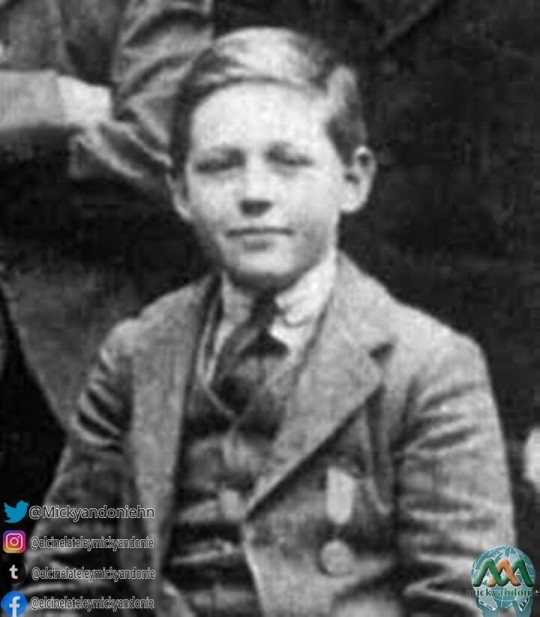
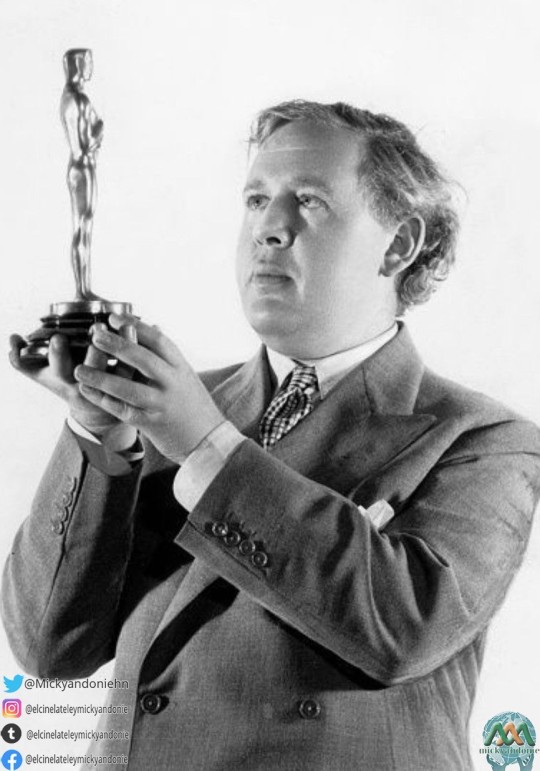
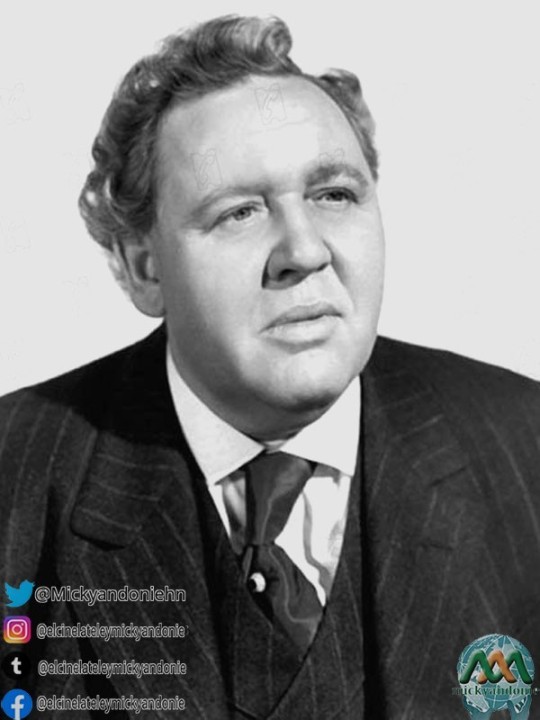
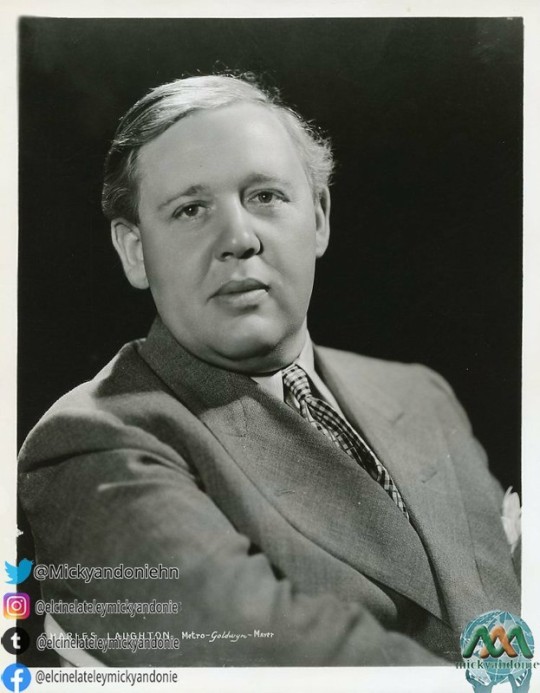

Charles Laughton.
Filmografía
Películas
- Bluebottles, The Tonic, Daydreams (1928) Dir.: Ivor Montagu
- Piccadilly (1929) Dir.: Ewald Andrea Dupont.
- Wolves (1930).
- Down River (1931) Dir. Peter Godfrey
-El caserón de las sombras (The Old Dark - House, 1932) Dir. James Whale
- Entre la espada y la pared (The Devil and the Deep, 1932) Dir. Marion Gering
- Justicia divina/El asesino de Mr. Medland (Payment Deferred, 1932) Dir. Lothar Mendes
- El signo de la cruz (The Sign of the Cross, 1932) Dir. Cecil B. De Mille
- Si yo tuviera un millón (If I Had a Million, 1932) Dirs. Ernst Lubitsch, Norman Taurog, Stephen Roberts, Norman McLeod, James Cruse, William A. - Seiter y H. Bruce Humberstone
- La isla de las almas perdidas (Island of Lost Souls, 1932) Dir. Erle C. Kenton
- La vida privada de Enrique VIII (The Private Life of Henry VIII, 1933) Dir. Alexander Korda
- White Woman (1933) Dir. Stuart Walker
- The Barretts of Wimpole Street (1934) Dir. Sidney Franklin
- Nobleza obliga (Ruggles of Red Gap, 1935) Dir. Leo McCarey
- Los miserables (Les Misérables, 1935) Dir. Richard Boleslawsky
- Rebelión a bordo (Mutiny on the Bounty, 1935) Dir. Frank Lloyd
- Rembrandt (Rembrandt, 1936) Dir. Alexander Korda
- Yo, Claudio (I, Claudius, 1937) Dir. Joseph von Sternberg.
- Bandera amarilla (Vessel of Wrath, 1938) Dir. Eric Pommer (Laughton es actor y coproductor de esta película).
- Las calles de Londres (St. Martin's Lane, 1938) Dir. Tim Whelan (Laughton es actor y coproductor de esta película).
- La posada de Jamaica (Jamaica Inn, 1939) Dir. Alfred Hitchcock (Laughton es actor y coproductor de esta película).
- Esmeralda, la zíngara (The Hunchback of Notre Dame, 1939) Dir. William Dieterle
- Laughton en la película Ellos sabían lo que querían (1940), con Carole Lombard y Frank Fay.
- They Knew What They Wanted (1940) Dir. Garson Kanin
- Casi un ángel (It Started with Eve, 1941) Dir. Henry Koster
- Se acabó la gasolina (The Tuttles of Tahiti, 1942) Dir. Charles Vidor
- Seis destinos (Tales of Manhattan, 1942) Dir. Julien Duvivier
- Stand by for Action (1943) Dir. Robert Z. Leonard
- Forever and a Day (1943) Dirs. René Clair, Edmund Goulding, Cedric Hardwicke, Frank Lloyd, Victor Saville.
-Esta tierra es mía (This Land Is Mine, 1943) Dir. Jean Renoir
- The Man from Down Under (1943) Dir. Robert Z. Leonard
- The Canterville Ghost (1944) Dir. Jules Dassin
- El sospechoso (The Suspect, 1944) Dir. Robert Siodmak
- El capitán Kidd (Captain Kidd, 1945) Dir. Rowland V. Lee
- Su primera noche (Because of Him, 1946) Dir. Richard Wallace
- Arco de triunfo (Arch of Triumph, 1947) Dir. Lewis Milestone
- El reloj asesino (The Big Clock, 1947) Dir. John Farrow
- El proceso Paradine (The Paradine Case, 1948) Dir. Alfred Hitchcock
- On our Merry way/A Miracle can Happen (1948) Dirs. King Vidor, Leslie Fenton, John Huston, George Stevens.
- The Girl from Manhattan (1948) Alfred E. Green
- Soborno (The Bribe, 1949) Dir. Robert Z. Leonard
- El hombre de la torre Eiffel (The Man on the Eiffel Tower, 1949) Dir. Burgess Meredith (codirectores no acreditados: Charles Laughton y Franchot Tone).
- No estoy sola (The Blue Veil, 1951) Dir. Curtis Bernhardt
- The Strange Door (1951) Dir. Joseph Pevney
- Cuatro páginas de la vida (O. Henry's Full House, 1952) Dir. Henry Koster
- Abbott and Costello Meet Captain Kidd (1952) Dir. Charles Lamont
- Salomé (Salome, 1953) Dir. William Dieterle
- La reina virgen (Young Bess, 1953) Dir. George Sidney
- El déspota (Hobson's Choice, 1954) Dir. David Lean
- La noche del cazador (The Night of the Hunter, 1954) Dir. Charles Laughton (no aparece como actor en la película).
T- estigo de cargo (Witness for the Prosecution, 1957) Dir. Billy Wilder
- Bajo diez banderas (Sotto dieci bandiere, 1960) Dir. Diulio Colletti
Espartaco (Spartacus, 1960) Dir, Stanley Kubrick
- Tempestad sobre Washington (Advise and Consent, 1962) Dir. Otto Preminger.
Documentales
- The Epic That Never Was (1965). Dirigido por Bill Duncalf y presentado por Dirk Bogarde. Documental de la BBC sobre el rodaje de I, Claudius con diversas escenas acabadas. (VHS, DVD).
- Callow's Laughton (1987). Documental de la Yorkshire TV-ITV dirigido por Nick Gray y presentado por Simon Callow sobre Charles Laughton.
- Charles Laughton Directs The Night of the Hunter (2002). Documental dirigido por Robert Gitt a partir de tomas descartadas de la Película.
Teatro
Debut teatral (1913). Stonyhurst College, Reino Unido
- The Private Secretary per Charles Hawtrey
Teatro amateur (hasta 1925). Scarborough, Reino Unido
- The Dear Departed por Stanley Houghton
- Trelawney of The Wells por Arthur Wing Pinero
- Hobson's Choice por Harold Brighouse
1926
- The Government Inspector. por Nicolai Gogol. Dir. Theodore Komisarjevsky
- Los puntales de la sociedad por Henrik Ibsen. Dir. Sybil Arundale
- El jardín de los cerezos por Antón Chéjov. Dir. Theodore Komisarjevsky
- Las tres hermanas por Antón Chéjov. Dir. Theodore Komisarjevsky
- Liliom por Ferencz Molnar. Dir. Theodore Komisarjevsky
1927
- The Greater Love por James B. Fagan. Dir. James B. Fagan y Lewis Casson
- Angela por Lady Bell. Dir. Lewis Casson
Vestire gli ignudi por Luigi Pirandello. Dir. Theodore Komisarjevsky
- Medea por Eurípides. Dir. Lewis Casson
- The Happy Husband por Harrison Owen. Dir. Basil Dean
- Paul Y por Dimitri Merejovski. Dir. Theodore Komisarjevsky
- Mr. Prohack por Arnold Bennet y Edward Knoblock. Dir. Theodore Komisarjevsky
1928
- A Man with Red Hair por Benn W. Levy, a partir de la novela de Hugh Walpole. Dir. Theodore Komisarjevsky
- The Making of an Immortal por George Moore. Dir. Robert Atkins
- Riverside Nights por Nigel Playfair y A.P. Herbert. Dir. Nigel Playfair
- Alibi per Michael Morton, a partir de la novela de Agatha Christie. Dir. Gerald duMaurier
- Mr. Pickwick por Cosmo Hamilton y Frank C. Reilly, a partir de la novela de Charles Dickens. Dir. Basil Dean
1929
- Beauty por Jacques Deval (adapt. inglesa: Michael Morton). Dir. Felix Edwardes
- The Silver Tassie por Sean O'Casey. Dir. Raymond Massey
1930
- French Leave por Reginald Berkeley. Dir. Eille Norwood
- On the Spot por Edgar Wallace. Dir. Edgar Wallace
1930
- Payment Deferred por Jeffrey Dell, a partir de la novela de C.S. Forrester. Dir. H.K. Ailiff
1931
-Gira americana (Chicago y Nueva York) de Payment Deferred y Alibi (esta última retítulada The Fatal Alibi y dirigida por Jed Harris).
Old Vic: temporada 1933-34. Londres. Reino Unido. Todas las obras dirigidas por Tyrone Guthrie.
El jardín de los cerezos por Antón Chéjov. Dir. Charles Laughton
1951-52 Estados Unidos y Reino Unido (Gira).
Don Juan in Hell de Man and Superman por George Bernard Shaw. Dir. Charles Laughton.
1953 Estados Unidos (Gira).
John Brown's Body por Stephen Vincent Benet. Dir. y Adaptación: Charles Laughton (no apareció como actor).
1954 Estados Unidos (Gira).
The Caine Mutiny Court Martial por Herman Wouk, a partir de su novela. Dir. Charles Laughton (no apareció como actor).
1956 Nueva York, Estados Unidos.
Major Barbara por George Bernard Shaw. Dir. Charles Laughton
1956 Londres, Reino Unido
The Party por Jane Arden. Dir. Charles Laughton
1959 Stratford-upon-Avon, Reino Unido
El sueño de una noche de verano por William Shakespeare. Dir. Peter Hall
El rey Lear por William Shakespeare. Dir. Glen Byam Shaw.
Créditos: Tomado de Wikipedia
https://es.wikipedia.org/wiki/Charles_Laughton
#HONDURASQUEDATEENCASA
#ELCINELATELEYMICKYANDONIE
4 notes
·
View notes
Photo

Yes, his autograph is part of my character Actor autograph collection.
I found this extensive biography online.
Lionel Jay Stander (January 11, 1908 – November 30, 1994) was an American actor in films, radio, theater, and television.
Lionel Stander was born in The Bronx, New York, to Russian-Jewish immigrants, the first of three children.
According to newspaper interviews with Stander, as a teenager, he appeared in the silent film MEN OF STEEL (1926), perhaps as an extra, since he is not listed in the credits.
During his one year at the University of North Carolina at Chapel Hill, he appeared in the student productions The Muse of the Unpublished Writer, and The Muse and the Movies: A Comedy of Greenwich Village.
Stander's acting career began in 1928, as Cop and First Fairy in Him by E. E. Cummings, at the Provincetown Playhouse. He claimed that he got the roles because one of them required shooting craps, which he did well, and a friend in the company volunteered him. He appeared in a series of short-lived plays through the early 1930s, including The House Beautiful, which Dorothy Parker famously derided as "the play lousy".
In 1932, Stander landed his first credited film role in the Warner-Vitaphone short feature IN THE DOUGH (1932), with Fatty Arbuckle and Shemp Howard. He made several other shorts, the last being THE OLD GREY MAYOR (1935) with Bob Hope in 1935. That same year, he was cast in a feature, Ben Hecht's THE SCOUNDREL (1935), with Noël Coward. He moved to Hollywood and signed a contract with Columbia Pictures. Stander was in a string of films over the next three years, appearing most notably in Frank Capra's MR. DEEDS GOES TO TOWN (1936) with Gary Cooper, MEET NERO WOLFE (1936) playing Archie Goodwin, THE LEAGUE OF FRIGHTENED MEN (1937), and A STAR IS BORN (1937) with Janet Gaynor and Fredric March.
Stander's distinctive rumbling voice, tough-guy demeanor, and talent with accents made him a popular radio actor. In the 1930s and 1940s, he was on The Eddie Cantor Show, Bing Crosby's KMH show, the Lux Radio Theater production of A Star Is Born, The Fred Allen Show, the Mayor of the Town series with Lionel Barrymore and Agnes Moorehead, Kraft Music Hall on NBC, Stage Door Canteen on CBS, the Lincoln Highway Radio Show on NBC, and The Jack Paar Show, among others.
In 1941, he starred in a short-lived radio show called The Life of Riley on CBS, no relation to the radio, film, and television character later made famous by William Bendix. Stander played the role of Spider Schultz in both Harold Lloyd's film THE MILKY WAY (1936) and its remake ten years later, THE KID FROM BROOKLYN (1946), starring Danny Kaye. He was a regular on Danny Kaye's zany comedy-variety radio show on CBS (1946–1947), playing himself as "just the elevator operator" amidst the antics of Kaye, future Our Miss Brooks star Eve Arden, and bandleader Harry James.
Also during the 1940s, he played several characters on The Woody Woodpecker and Andy Panda animated theatrical shorts, produced by Walter Lantz. For Woody Woodpecker, he provided the voice of Buzz Buzzard, but was blacklisted from the Lantz studio in 1951 and was replaced by Dal McKennon.
Strongly liberal and pro-labor, Stander espoused a variety of social and political causes and was a founding member of the Screen Actors Guild. At a SAG meeting held during a 1937 studio technicians' strike, he told the assemblage of 2000 members: "With the eyes of the whole world on this meeting, will it not give the Guild a black eye if its members continue to cross picket lines?" (The NYT reported: "Cheers mingled with boos greeted the question.") Stander also supported the Conference of Studio Unions in its fight against the Mob-influenced International Alliance of Theatrical Stage Employees (IATSE). Also in 1937, Ivan F. Cox, a deposed officer of the San Francisco longshoremen's union, sued Stander and a host of others, including union leader Harry Bridges, actors Fredric March, Franchot Tone, Mary Astor, James Cagney, Jean Muir, and director William Dieterle. The charge, according to Time magazine, was "conspiring to propagate Communism on the Pacific Coast, causing Mr. Cox to lose his job".
In 1938, Columbia Pictures head Harry Cohn allegedly called Stander "a Red son of a bitch" and threatened a US$100,000 fine against any studio that renewed his contract. Despite critical acclaim for his performances, Stander's film work dropped off drastically. After appearing in 15 films in 1935 and 1936, he was in only six in 1937 and 1938. This was followed by just six films from 1939 through 1943, none made by major studios, the most notable being GUADALCANAL DIARY (1943).
Stander was among the first group of Hollywood actors to be subpoenaed before the House Un-American Activities Committee (HUAC) in 1940 for supposed Communist activities. At a grand jury hearing in Los Angeles in August 1940—the transcript of which was shortly released to the press—John R. Leech, the self-described former "chief functionary" of the Communist Party in Los Angeles, named Stander as a CP member, along with more than 15 other Hollywood notables, including Franchot Tone, Humphrey Bogart, James Cagney, Clifford Odets, and Budd Schulberg. Stander subsequently forced himself into the grand jury hearing, and the district attorney cleared him of the allegations.
Stander appeared in no films between 1944 and 1945. Then, with HUAC's attention focused elsewhere due to World War II, he played in a number of mostly second-rate pictures from independent studios through the late 1940s. These include Ben Hecht's SPECTER OF THE ROSE (1946); the Preston Sturges comedy THE SIN OF HAROLD DIDDLEBOCK (1947) with Harold Lloyd; and TROUBLE MAKERS (1948) with The Bowery Boys. One classic emerged from this period of his career, the Preston Sturges comedy UNFAITHFULLY YOURS (1948) with Rex Harrison.
In 1947, HUAC turned its attention once again to Hollywood. That October, Howard Rushmore, who had belonged to the CPUSA in the 1930s and written film reviews for the Daily Worker, testified that writer John Howard Lawson, whom he named as a Communist, had "referred to Lionel Stander as a perfect example of how a Communist should not act in Hollywood." Stander was again blacklisted from films, though he played on TV, radio, and in the theater.
In March 1951, actor Larry Parks, after pleading with HUAC investigators not to force him to "crawl through the mud" as an informer, named several people as Communists in a "closed-door session", which made the newspapers two days later. He testified that he knew Stander, but did not recall attending any CP meetings with him.
At a HUAC hearing in April 1951, actor Marc Lawrence named Stander as a member of his Hollywood Communist "cell", along with screenwriter Lester Cole and screenwriter Gordon Kahn. Lawrence testified that Stander "was the guy who introduced me to the party line", and that Stander said that by joining the CP, he would "get to know the dames more" — which Lawrence, who did not enjoy film-star looks, thought a good idea. Upon hearing of this, Stander shot off a telegram to HUAC chair John S. Wood, calling Lawrence's testimony that he was a Communist "ridiculous" and asked to appear before the Committee, so he could swear to that under oath. The telegram concluded: "I respectfully request an opportunity to appear before you at your earliest possible convenience. Be assured of my cooperation." Two days later, Stander sued Lawrence for $500,000 for slander. Lawrence left the country ("fled", according to Stander) for Europe.
After that, Stander was blacklisted from TV and radio. He continued to act in theater roles and played Ludlow Lowell in the 1952-53 revival of Pal Joey on Broadway and on tour.
Two years passed before Stander was issued the requested subpoena. Finally, in May 1953, he testified at a HUAC hearing in New York, where he made front-page headlines nationwide by being uproariously uncooperative, memorialized in the Eric Bentley play, Are You Now or Have You Ever Been. The New York Times headline was "Stander Lectures House Red Inquiry." In a dig at bandleader Artie Shaw, who had tearfully claimed in a Committee hearing that he had been "duped" by the Communist Party, Stander testified,
"I am not a dupe, or a dope, or a moe, or a schmoe...I was absolutely conscious of what I was doing, and I am not ashamed of anything I said in public or private."
An excerpt from that statement was engraved in stone for "The First Amendment Blacklist Memorial" by Jenny Holzer at the University of Southern California.
Other notable statements during Stander's 1953 HUAC testimony:
- "[Testifying before HUAC] is like the Spanish Inquisition. You may not be burned, but you can't help coming away from a little singed."
- "I don't know about the overthrow of the government. This committee has been investigating 15 years so far, and hasn't found one act of violence."
- "I know of a group of fanatics who are desperately trying to undermine the Constitution of the United States by depriving artists and others of life, liberty, and the Pursuit of Happiness without due process of law ... I can tell names and cite instances and I am one of the first victims of it. And if you are interested in that and also a group of ex-fascists and America-Firsters and anti-Semites, people who hate everybody including Negroes, minority groups and most likely themselves ... and these people are engaged in a conspiracy outside all the legal processes to undermine the very fundamental American concepts upon which our entire system of democracy exists."
- "...I don't want to be responsible for a whole stable of informers, stool pigeons, and psychopaths and ex-political heretics, who come in here beating their breast and say, 'I am awfully sorry; I didn't know what I was doing. Please--I want absolution; get me back into pictures.'"
- "My estimation of this committee is that this committee arrogates judicial and punitive powers which it does not possess."
Stander was blacklisted from the late 1940s until 1965; perhaps the longest period.
After that, Stander's acting career went into a free fall. He worked as a stockbroker on Wall Street, a journeyman stage actor, a corporate spokesman—even a New Orleans Mardi Gras king. He didn't return to Broadway until 1961 (and then only briefly in a flop) and to film in 1963, in the low-budget THE MOVING FINGER (although he did provide, uncredited, the voice-over narration for the 1961 noir thriller BLAST OF SILENCE.)
Life improved for Stander when he moved to London in 1964 to act in Bertolt Brecht's Saint Joan of the Stockyards, directed by Tony Richardson, for whom he'd acted on Broadway, along with Christopher Plummer, in a 1963 production of Brecht's The Resistible Rise of Arturo Ui. In 1965, he was featured in the film PROMISE HER ANYTHING. That same year Richardson cast him in the black comedy about the funeral industry, THE LOVED ONE, based on the novel by Evelyn Waugh, with an all-star cast including Jonathan Winters, Robert Morse, Liberace, Rod Steiger, Paul Williams, and many others. In 1966, Roman Polanski cast Stander in his only starring role, as the thug Dickie in CUL-DE-SAC, opposite Françoise Dorléac and Donald Pleasence.
Stander stayed in Europe and eventually settled in Rome, where he appeared in many spaghetti Westerns, most notably playing a bartender named Max in Sergio Leone's ONCE UPON A TIME IN THE WEST. He played the role of the villainous mob boss in Fernando Di Leo's 1972 poliziottescho thriller CALIBER 9. In Rome he connected with Robert Wagner, who cast him in an episode of It Takes a Thief that was shot there. Stander's few English-language films in the 1970s include THE GANG THAT COULDN'T SHOOT STRAIGHT (1971) with Robert De Niro and Jerry Orbach, Martin Scorsese's NEW YORK, NEW YORK (1977), which also starred De Niro and Liza Minnelli, and Steven Spielberg's 1941 (1979).
Stander played a supporting role in the TV film Revenge Is My Destiny with Chris Robinson. He played a lounge comic modeled after the real-life Las Vegas comic Joe E. Lewis, who used to begin his act by announcing "Post Time" as he sipped his ever-present drink.
After 15 years abroad, Stander moved back to the U.S. for the role he is now most famous for: Max, the loyal butler, cook, and chauffeur to the wealthy, amateur detectives played by Robert Wagner and Stefanie Powers on the 1979–1984 television series Hart to Hart (and a subsequent series of Hart to Hart made-for-television films). In 1983, Stander won a Golden Globe Award for Best Supporting Actor – Series, Miniseries or Television Film.
In 1986, he became the voice of Kup in THE TRANSFORMERS: THE MOVIE. In 1991 he was a guest star in the television series Dream On, playing Uncle Pat in the episode "Toby or Not Toby". His final theatrical film role was as a dying hospital patient in THE LAST GOOD TIME (1994), with Armin Mueller-Stahl and Olivia d'Abo, directed by Bob Balaban.
Stander was married six times, the first time in 1932 and the last in 1972. All but the last marriage ended in divorce. He fathered six daughters (one wife had no children, one had twins).
Stander died of lung cancer in Los Angeles, California, in 1994 at age 86. He was buried in Glendale's Forest Lawn Memorial Park Cemetery.
3 notes
·
View notes
Audio
Paul Whiteman And His Orchestra
MY HEART STOOD STILL
Bix Beiderbecke (cnt) Henry Busse, Bob Mayhew, Charlie Margulis (tp) Bill Rank, Boyce Cullen, Wilbur Hall (tb) Jack Fulton (tb,vcl) Jimmy Dorsey, Chester Hazlett, Hal McLean (cl,as) Frankie Trumbauer (c-mel) Charles Strickfaden (as,bar) Rube Crozier (ts,bassoon) Jack Mayhew (as) Nye Mayhew (as,ts) Kurt Dieterle, Mischa Russell, Mario Perry, John Bowman (vln) Matty Malneck (viola,arr) Harry Perrella (p) Mike Pingitore (bj) Mike Trafficante (tu) Steve Brown (b) Harold McDonald (d) Jack Fulton, Charles Gaylord, Austin "Skin" Young (vcl) Bill Challis (arr) Paul Whiteman (dir)
Victor 35883
Camden, N.J., January 24, 1928
jazz-on-line-com
3 notes
·
View notes
Text
December 2018 in Pictures
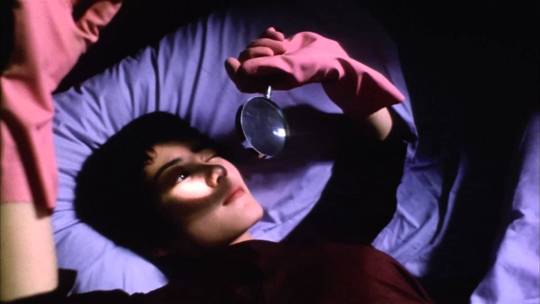
Cleopatra (1963/Joseph L. Mankiewicz)
The Night of the Generals (1967/Anatole Litvak)
Madam Satan (1930/Cecil B. DeMille)
The Man Who Had His Hair Cut Short (1966/André Delvaux)
® Ball of Fire (1941/Howard Hawks)
The Amazing Dr. Clitterhouse (1938/Anatole Litvak)
Artists and Models (1955/Frank Tashlin)
The Paleface (1948/Norman Z. McLeod)
The Exiles (1961/Kent MacKenzie)
Hi, Nellie! (1934/Mervyn LeRoy)
® M (1931/Fritz Lang)
Lost Horizon (1937/Frank Capra)
Deception (1946/Irving Rapper)
Utu (1984/Geoff Murphy)
The Working Man (1933/John G. Adolfi)
Monsieur Beaucaire (1946/George Marshall)
Child Bride (1938/Harry Revier)
Goodbye Solo (2008/Ramin Bahrani)
Call Me by Your Name (2017/Luca Guadagnino)
Cold War (2018/Paweł Pawlikowski)
Blackmail (1929/Alfred Hitchcock)
The Four Times (2010/Michelangelo Frammartino)
Scream (1996/Wes Craven)
Babes in Arms (1939/Busby Berkeley)
Hôtel Terminus (1988/Marcel Ophüls)
The Spider's Stratagem (1970/ Bernardo Bertolucci)
Dog Star Man (1964/Stan Brakhage)
Too Early/Too Late (1982/Jean-Marie Straub, Danièle Huillet)
Méditerranée (1963/Jean-Daniel Pollet, Volker Schlöndorff)
A Throw of Dice (1929/Franz Osten)
Judge Priest (1934/John Ford)
The Big Sky (1952/Howard Hawks)
Ceddo (1977/Ousmane Sembene)
2 or 3 Things I Know About Her (1967/Jean-Luc Godard)
Possibly in Michigan (1983/Cecelia Condit)
I Shot Jesse James (1949/Samuel Fuller)
Come Drink with Me (1966/King Hu)
Oklahoma! (1955/Fred Zinnemann)
Two Rode Together (1961/John Ford)
® Cape Fear (1962/J. Lee Thompson)
Dr. Ehrlich’s Magic Bullet (1940/William Dieterle)
The Five Venoms (1978/Chang Cheh)
Jeeves and Wooster: Season 1 (1990)
Attack the Gas Station! (1999/Kim Sang-jin)
Drums Along the Mohawk (1939/John Ford)
Caged (1950/John Cromwell)
Passport to Pimlico (1949/Henry Cornelius)
The Yearling (1946/Clarence Brown)
Juarez (1939/William Dieterle)
The Black Room (1982/Elly Kenner, Norman Thaddeus Vane)
A Very Long Engagement (2004/Jean-Pierre Jeunet)
Boomerang! (1947/ Elia Kazan)
Project A (1983/Jackie Chan, Sammo Hung)
Project A II (1987/Jackie Chan)
Broken Lance (1954/Edward Dmytryk)
Beyond the Forest (1949/King Vidor)
Strait-Jacket (1964/William Castle)
Laugh, Clown, Laugh (1928/Herbert Brenon)
He Who Gets Slapped (1924/ictor Sjöström)
Dracula Has Risen from the Grave (1968/Freddie Francis)
It Always Rains on Sunday (1947/Robert Hamer)
Garden of Evil (1954/Henry Hathaway)
Show Them No Mercy! (1935/George Marshall)
The Comancheros (1961/Michael Curtiz)
Scrooged (1988/Richard Donner)
I Died a Thousand Times (1955/Stuart Heisler)
The Crime of Monsieur Lange (1936/Jean Renoir)
Born Yesterday (1950/George Cukor)
Middlemarch (1994)
An Actor’s Revenge (1963/Kon Ichikawa)
® Nosferatu (1922/F.W. Murnau)
Drácula (1931/George Melford)
® Dracula (1931/Tod Browning)
Dracula’s Daughter (1936/Lambert Hillyer)
Son of Dracula (1943/Robert Siodmak)
The Bird with the Crystal Plumage (1970/Dario Argento)
Oktyabr (1928/Sergei M. Eisenstein)
® The Mummy (1932/Karl Freund)
The Mummy’s Hand (1940/Christy Cabanne)
The Mummy’s Tomb (1942/Harold Young)
The Mummy’s Ghost (1944/Reginald Le Borg)
The Mummy’s Curse (1944/Leslie Goodwins)
® The Wolf Man (1941/George Waggner)
® Frankenstein Meets the Wolf Man (1943/Roy William Neill)
® Frankenstein (1931/James Whale)
® The Bride of Frankenstein (1935/James Whale)
® Son of Frankenstein (1939/Rowland V. Lee)
The Ghost of Frankenstein (1942/Erle C. Kenton)
House of Frankenstein (1944/Erle C. Kenton)
Special Agent (1935/William Keighley)
Tuesday, After Christmas (2010/Radu Muntean)
Starting Out in the Evening (2007/Andrew Wagner)
Frozen River (2008/Courtney Hunt)
Everlasting Moments (2008/Jan Troell)
® To Be or Not to Be (1942/Ernst Lubitsch)
Lady Macbeth (2016/William Oldroyd)
® Chungking Express (1994/Wong Kar-wai)
Best experiences in bold, other recommended ones are linked. ® revisited.
2 notes
·
View notes
Text
The Defense Rests
1934, Lambert Hillyer
Jack Holt, Jean Arthur, Nat Pendleton, Arthur Hohl, Raymond Walburn, Harold Huber, Robert Gleckler, Sarah Padden, Shirley Grey, Donald Meek
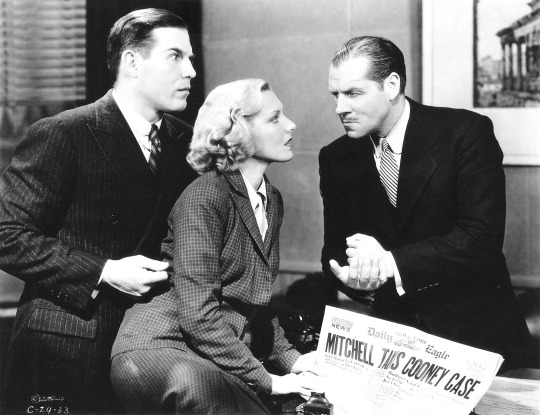
A mozitörténet első Batman filmjeit megrendező Lambert Hillyer ügyvéddrámája pár évvel az igazán sikeres tárgyalótermi filmek (The Mouthpiece, 1932, James Flood, Elliott Nugent; Lawyer Man, 1932, William Dieterle; Counsellor-at-Law, 1933, William Wyler) után, másrészt viszont egy évvel Jean Arthur sztárra válása előtt, láthatóan mérsékelt ambíciókkal készülhetett, de pár furcsaságtól eltekintve, valamint kapkodó lezárása ellenére korántsem vall teljes kudarcot.
Jack Holt egyike volt azoknak a némafilmcsillagoknak, akik a hangosfilm térhódítása után is többé-kevésbé sikeresek tudtak maradni. Holt egész karrierje a westernfilmekhez kötődik, ahol többnyire valódi tesztoszteronbomba hősöket formált meg. Margaret Mitchell, az Elfújta a szél szerzője kifejezetten szerette volna, hogy a maszkulin színész kapja meg Rhett Butler szerepét sikerregénye filmváltozatában. (Érdekes módon az erőteljes, baltával faragott állú Holt mellett az írónő a sokkal finomabb férfikaraktert hozó Charles Boyert látta volna szívesen a főszerepben, ha nem lett volna utóbbinak igen erős francia akcentusa). Olyannyira jellegzetes képviselője volt az efajta hősöknek, hogy Chester Gould róla mintázta híres képregénykarakterét Dick Tracyt, majd később az ő képmását hordozta Tracy paródiája, a későbbi népszerű Mad magazint ihlető Fearless Fosdick is.
Holt érdekes választás Matthew Mitchell gátlástalan ügyvéd szerepére, bár létezhet valamiféle kapocs a vadnyugat (saját) értékrendjükben megingathatatlan, ám a szabályokat tetszés szerint hajlítgató, ha kell embert is ölő pisztolyhősei, és egy, az ügyfelei felmentéséért mindent bevető védőügyvéd között. Mitchell hamis tanúzásra bíztat, tényeket változtat meg, kihasználja női ügyfelei kellemes külsejét, utasítja őket, villogtassák a combjukat, sírjanak, tegyenek meg mindent az esküdtszék szimpátiájáért. Az ő irodájában jelentkezik munkáért Arthur frissen diplomázott idealistája, hogy aztán kioktassa, megfenyegesse munkaadóját, amennyiben az nem tér jó útra. ("What is this, a law office?/No, an outlaw office,") Joggal gyaníthatjuk, őt is csak csinos alkata menti meg attól, hogy egy ilyen Mitchell-féle karakter öt perc után kirúgja.
A továbbiakban hőseinket szakmailag éppúgy mint erkölcsileg próbára teendő egy ártatlanul gyilkossággal vádolt asszony és egy gyerekgyilkos ügye is Mitchell irodájához kerül, melyek megoldása egészen izgalmasan bonyolódik és mindkét karakter valóban súlyos döntéseket lesz kénytelen meghozni. Bár panaszra nincs különösebb okunk, tény, hogy a Columbia jól ítélte meg, nem ebből a forgatókönyvből fogják az év filmjét forgatni. A szűkösebb anyagiak ellenére a film képileg mívesebben kidolgozott mint a műfajban megszokott. Joseph August, Hillyer hű operatőre (ez volt a 22., egyben utolsó közös munkájuk) szépen és okosan komponált képeivel a számos párbeszédjelenetet is dinamikussá teszi.
Holt tulajdonképpen hiteles mint dörzsölt ügyvéd, de a nézők feltétlen szimpátiáját Mitchell figurájával nem nyerheti el. Arthur ellenben meglehetősen hiteltelen, jelentősen nehezíti a dolgát logikátlanul megírt, többször is nehezen visszafejthető motivációktól vezetve cselekvő karaktere. A New York Times korabeli kritikája szerinti "pergő cselekmény" a záró szakaszra már igen gyors, érthetetlenül kapkodva hadaró történetmeséléssé válik, ahol a főhősök zaklatott munkakapcsolata egy szempillantás alatt válik romantikussá, mihelyt a páros helytelen utakon járó tagja meghozza azt a döntést amit már a szinopszist olvasva is biztosra vehettünk. (3/5)
0 notes
Text
Here’s What You Should Be Grilling This Labor Day Weekend

Beef up your hanger steak with a tangy red wine marinade and sauce, courtesy of chef Floyd Cardoz.
If you’ve experienced late-summer culinary fatigue and you haven’t gone near your barbecue in a while, now is the time to brush up on your skills, because Labor Day weekend is your last chance to make the ultimate grilling feast before the season is over. We encourage you to wear all the white clothing you have before you need to stash it away (we don’t make the rules, we just enforce them) and take no responsibility for stains, spots and/or smears.
Recipe: Floyd Cardoz’s Grilled Hanger Steak
This recipe requires some advance planning, since hanger steak is best when it is marinated before cooking. A bold marinade complements the assertively flavored meat and tenderizes it a bit as well. Here I use a red wine with big flavor both to marinate the meat and in a reduced sauce — which incorporates the marinade after the meat is grilled. This way nothing — including all that great flavor — goes to waste.

Crisp, smoky wings with a sauce that’s cooling and spicy all at once. Tandoori wings are the total package. (Photos: Gabi Porter.)
Recipe: Grilled Tandoori Chicken Wings With Coriander Yogurt
Indians don’t glorify chicken wings the way Americans do, so I’m stepping in to bridge that inexplicable gap. When faced with chicken and the possibility of high-heat smoky cooking, such as any ol’ charcoal grill, there’s only one preparation on my mind. I’ve tandoorified and char-grilled everything from pork loin and tofu steaks to more traditional fare like shrimp and lamb chops. Brine and baste all you want, but tandoorification (my word for marinating overnight in heavily spiced yogurt) is the way to go if your end game is “juicy and flavorful.”

Slow-roasted glazed sweet potatoes, spicy chorizo and lots of cheese make these stuffed peppers sing on the grill. (Photos: Gabi Porter.)
Recipe: Chorizo And Cheese Grilled Stuffed Bell Peppers
We’re going to pop open and clear out the peppers, grill them up a bit, fill them with goodies and then throw them back on the grill to finish up. The result is a smoky, charred exterior on a completely cooked pepper that’s just oozing cheese, meat and other great stuff. After you make these, you will never look at a skewer filled with pepper slices the same way again.

Packed with Thai flavors such as coriander, lemongrass, galangal and coconut milk, these aren’t your typical grilled prawns. (Photo: Gabi Porter.)
Recipe: Harold Dieterle’s Grilled Prawns, Thai Style
Grilled prawns are grilled prawns. If you buy a nice, plump, fresh product from your favorite guy at the fish counter, you’re going to have a good time — even if you scorch the thing. But please don’t. Oftentimes grilled prawns (and shrimp for that matter) can be straightforward. Salt and pepper, a burst of acid. Done. New York City chef Harold Dieterle does the opposite, brushing the little guys with a spread made with some of Thailand’s most iconic flavors: coriander, lemongrass, galangal and lots of coconut milk. It’s as if you were sipping a bottle of Chang on a beach in Ko Samui. And when cooking with prawns, always leave the head on. That’s where the flavor is.

A bold, colorful, garlic-spiked recipe to make you yearn for grilling season all year round.
Recipe: Kevin Gillespie’s Grilled Pork Tenderloin With Spanish-Style Garlic Shrimp
It’s like Spanish surf and turf with shrimp and pork. The idea came from a Brazilian steakhouse in Atlanta, Fogo de Chao. They roast whole pork loins and carve them for you tableside. It’s good, but I always thought it would be better with some surf to go with the turf.

The island seasonings make this chicken truly unforgettable.
Recipe: Grilled Chicken With Spicy West Indian Salsa Verde
This has to be our best-loved chicken dish. The well-seasoned chicken also gets a “post-cooking” marinade; it is tossed in a bit of West Indian salsa verde and put in the oven for a few minutes so the salsa verde flavors can be absorbed into the chicken. The combo of the chargrill, the island seasonings and the kick of the West Indian salsa verde is truly unforgettable.

Update your fajita routine with this porky dish.
Recipe: Oaxacan Grilled Pork Fajitas
In Oaxaca, they use thinly sliced pork shoulder, which is loaded with fat, so it stays moist on the grill. If you have the patience, thinly slice boneless pork shoulder (we’re talking poker chip thin here), or bribe your butcher to do it. Otherwise, use pork loin or tenderloin thinly sliced across the grain. It helps if you partially freeze it first.

Photo: Ed Anderson
Recipe: Grilled Coriander-Crusted Fish Steaks With Gazpacho Relish
Chef Chris Schlesinger and Cook’s Illustrated executive editor John Willoughby have combined their forces once more with their new cookbook, The Big-Flavor Grill. These truly simple and delicious recipes don’t take a lot of time or effort but are (as they say) big-flavor dishes. Try this easy spice-rubbed fish steak recipe on for size. The gazpacho relish takes about five minutes to make and adds a burst of bright flavor to the hearty fish.

Keep it light and meatless with these mushroom tacos.
Recipe: Grilled Portobello Mushroom Tacos
Anyone who’s ever loved a taco should hit L.A.’s Pink Taco with an empty belly and a fierce craving. In honor of Food Republic Grilling Month, we borrowed a meatless recipe from chef Sam Anguiano. “Mushroom tacos are perfect for the food lover who wants a good taco but doesn’t eat meat. Grilling them over live mesquite will give you optimum flavor. The portobello should be grilled through but still have some bite to create different layers of texture. Carnivore or not, you will love this taco.” Agreed.

Recipe: Grilled Pork T-Bones With BBQ Butter
Just like beef T-bones, pork T-bones contain a lower piece of the loin (the strip loin section of a beef T-bone) and a section of the tenderloin (the fillet of the pig). I treat this simply: well seasoned, grilled to medium, and then topped with a thick pat of my BBQ Butter. Delish! The BBQ Butter can be made ahead and frozen. Just pull out a portion a couple of hours before needed. I also love to use it to top steaks, chops, and even breads for a nifty treat.

Source: http://www.foodrepublic.com/2018/08/30/labor-day-feast-inspiration-what-were-grilling/
0 notes
Photo
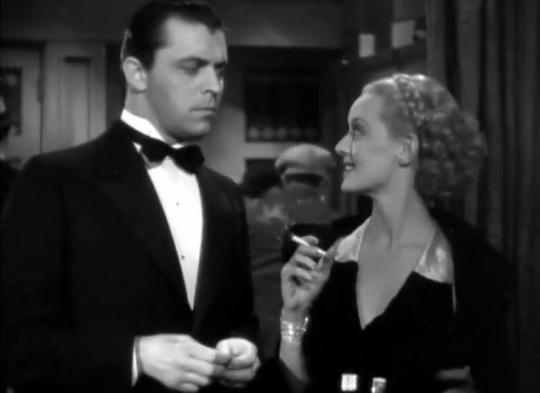
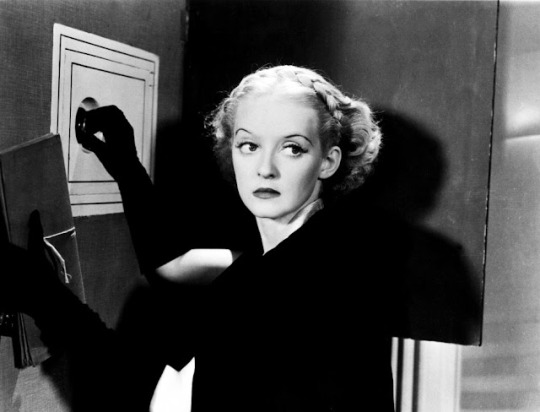
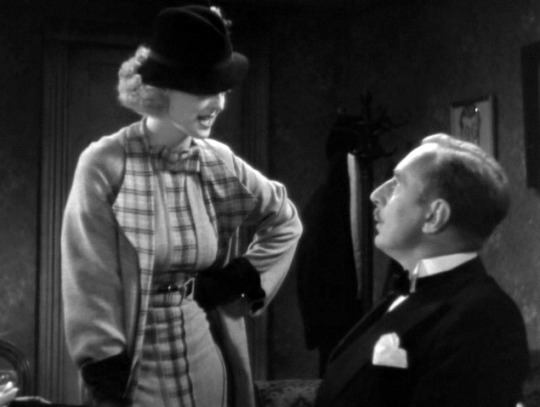
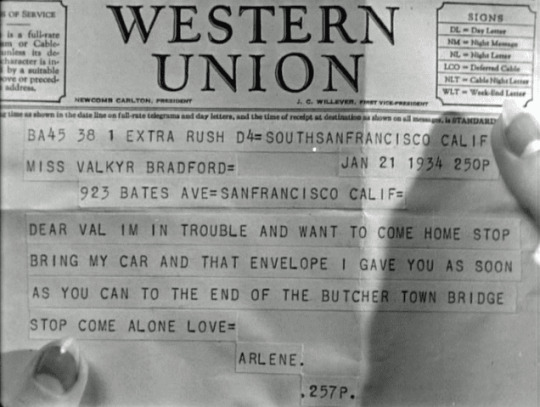
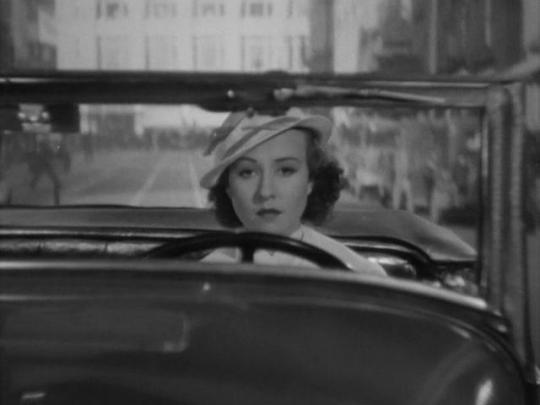
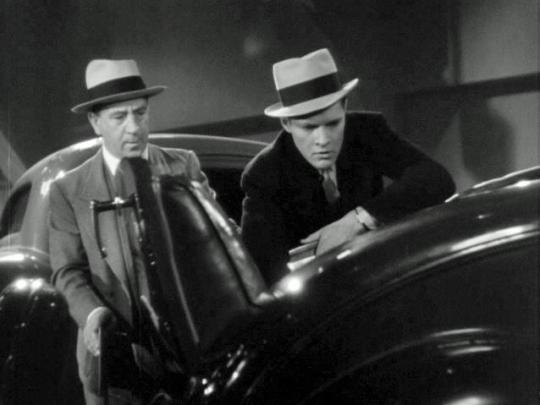



Fog Over Frisco (William Dieterle, 1934)
Cast: Bette Davis, Donald Woods, Margaret Lindsay, Lyle Talbot, Hugh Herbert, Arthur Byron, Robert Barrat, Henry O'Neill, Irving Pichel, Douglas Dumbrille, Alan Hale, Gordon Westcott. Screenplay: Robert N. Lee, Eugene Solow, based on a story by George Dyer. Cinematography: Tony Gaudio. Art direction: Jack Okey. Film editing: Harold McLernon. Music: Bernhard Kaun.
San Franciscans don't call it Frisco anymore but they do call the fog Karl. Not that fog has a lot to do with the story of Fog Over Frisco, which is mostly a fast-paced murder mystery involving a socially prominent family and some stolen securities. Although Bette Davis is nominally the star, she's the murder victim and disappears from the film halfway through. Her prominent billing probably has to do with the realization at Warner Bros. that she was becoming a big star: This is also the year of Of Human Bondage, the John Cromwell film that Davis made on loanout to RKO. Although Margaret Lindsay, who plays Davis's stepsister, has the larger part, and the cast is full of watchable character actors like Hugh Herbert, Alan Hale, and (in a small part) William Demarest, Davis still shines -- so much so that we miss her in the latter half of the movie. Another attraction to the film are the scenes shot on location in San Francisco, notably lacking any shots of the Golden Gate Bridge, which was under construction.
3 notes
·
View notes
Text
5 Things to Do This Weekend
5 Things to Do This Weekend
Our critics and writers have selected noteworthy cultural events to experience virtually and in person in New York City.
Classical Music
The Tulsa Massacre, Memorialized in Song
J’Nai Bridges stars in Adolphus Hailstork’s “Tulsa 1921 (Pity These Ashes, Pity This Dust),” which will stream at the Greene

View On WordPress
#American Dance Festival#Bridges#J&039;Nai#Children and Childhood#Classical Music#dancing#Dieterle#Harold#Feinstein&039;s/54 Below (Manhattan#NY#Music Venue)#Hailstork#Adolphus#Harlem Chamber Players#Iconis#Joe#Juneteenth#Music#Pop and Rock Music#Theater#Tulsa Race Riot (1921)
0 notes
Text







JAMES GRAIG.
Filmography
• Sophie Lang Goes West, de Charles Reisner (1937)
• This Way Please, de Robert Florey (1937)
• Thunder Trail, de Charles Barton (1937)
• Born to the West, de Charles Barton (1937)
• The Buccaneer, de Cecil B. DeMille (1938)
• The Big Broadcast of 1938, de Mitchell Leisen (1938)
• College Swing, de Raoul Walsh (1938)
• Pride of the West, de Lesley Selander (1938)
• North of Shanghai, de D. Ross Lederman (1939)
• The Lone Wolf Spy Hunt, de Peter Godfrey (1939)
• Flying G-Men, de James W. Horne y Ray Taylor (1939)
• Blondie Meets the Boss, de Frank R. Strayer (1939)
• Romance of the Redwoods, de Charles Vidor (1939)
• Rejas humanas, de Charles Vidor (1939)
• Outside These Walls, de Ray McCarey (1939)
• Missing Daughters, de Charles C. Coleman (1939)
• Pest from the West, de Del Lord (1939)
• Good Girls Go to Paris, de Alexander Hall (1939)
• Overland with Kit Carson, de Norman Deming y Sam Nelson (1939)
• Behind Prison Gates, de Charles Barton (1939)
• Trouble Finds Andy Clyde, de Jules White (1939)
• The Man They Could Not Hang, de Nick Grinde (1939)
• Konga, the White Stallion, de Sam Nelson (1939)
• Skinny the Moocher, de Del Lord (1939)
• Static in the Attic, de Charley Chase (1939)
• A Woman Is the Judge, de Nick Grinde (1939)
• Oily to Bed, Oily to Rise, de Jules White (1939)
• The Taming of the West, de Norman Deming (1939)
• Scandal Sheet, de Nick Grinde (1939)
• Two-Fisted Rangers, de Joseph H. Lewis (1939)
• Café Hostess, de Sidney Salkow (1940)
• Black Friday, de Arthur Lubin (1940)
• The House Across the Bay, de Archie Mayo (1940)
• Zanzibar, de Harold D. Schuster (1940)
• Enemy Agent, de Lew Landers (1940)
• Winners of the West, de Ray Taylor (1940)
• South to Karanga, de Harold D. Schuster (1940)
• Seven Sinners, de Tay Garnett (1940)
• I'm Nobody's Sweetheart Now, de Arthur Lubin (1940)
• Law and Order, de Ray Taylor (1940)
• Kitty Foyle, de Sam Wood (1940)
• Unexpected Uncle, de Peter Godfrey (1941)
• All That Money Can Buy, de William Dieterle (1941)
• Valley of the Sun, de George Marshall (1942)
• Friendly Enemies, de Allan Dwan (1942)
• The Omaha Trail, de Edward Buzzell (1942)
• Northwest Rangers, de Joseph M. Newman (1942)
• Seven Miles from Alcatraz, de Edward Dmytryk (1942)
• Freedom Comes High, de Lewis Allen (1942)
• The Human Comedy, de Clarence Brown (1943)
• Swing Shift Maisie, de Norman Z. McLeod (1943)
• Lost Angel, de Roy Rowland (1943)
• The Heavenly Body, de Alexander Hall (1944)
• Kismet, de William Dieterle (1944)
• Marriage Is a Private Affair, de Robert Z. Leonard (1944)
• Gentle Annie, de Andrew Marton (1944)
• Dangerous Partners, de Edward L. Cahn (1945)
• Our Vines Have Tender Grapes, de Roy Rowland (1945)
• She Went to the Races, de Willis Goldbeck (1945)
• The Scarlet Horseman, de Lewis D. Collins y Ray Taylor (1946)
• Boys' Ranch, de Roy Rowland (1946)
• Little Mister Jim, de Fred Zinnemann (1947)
• Dark Delusion, de Willis Goldbeck (1947)
• Man from Texas, de Leigh Jason (1948)
• Northwest Stampede, de Albert S. Rogell (1948)
• Side Street, de Anthony Mann (1950)
• Lady Without Passport, de Joseph H. Lewis (1950)
• The Strip, de László Kardos (1951)
• Drums in the Deep South, de William Cameron Menzies (1951)
• Hurricane Smith, de Jerry Hopper (1952)
• Fort Vengeance, de Lesley Selander (1953)
• Code Two, de Fred M. Wilcox (1953)
• Last of the Desperados, de Sam Newfield (1955)
• Mientras Nueva York duerme, de Fritz Lang (1956)
• Massacre, de Louis King (1956)
• The Women of Pitcairn Island, de Jean Yarbrough (1956)
• Shoot-Out at Medecine Bend, de Richard L. Bare (1957)
• The Persuader, de Dick Ross (1957)
• The Cyclops, de Bert I. Gordon (1957)
• Naked in the Sun, de R. John Hugh (1957)
• Ghost Diver, de Richard Einfeld (1957)
• Man or Gun, de Albert C. Gannaway (1958)
• Four Fast Guns, de William J. Hole Jr. (1960)
• Hostile Guns, de R.G. Springsteen (1967)
• Fort Utah, de Lesley Selander (1967)
• Arizona Bushwhackers, de Lesley Selander (1968)
• The Devil's Brigade, de Andrew V. McLaglen (1968)
• If He Hollers, Let Him Go!, de Charles Martin (1968)
• Body of the Prey, de Kenneth G. Crane (1970)
• Bigfoot, de Robert F. Slatzer (1970)
• The Tormentors, de David L. Hewitt (1971)
• Doomsday Machine, de Harry Hope y Lee Sholem (1972)
• Gruen Guild Playhouse (1953)
• Chevron Theatre (1953)
• The Ford Television Theatre (1954)
• Studio 57 (1954) y (1955)
• Science Fiction Theatre (1955)
• The Millionaire (1956)
• Broken Arrow (1957)
• Have Gun – Will Travel (1958)
• Death Valley Days (1960)
• Tales of Wells Fargo (1962)
• Daniel Boone (1967)
• Custer (1967)
• El virginiano (1968)
• The ABC Afternoon Playbreak (1972)
Créditos tomados de Wikipedia:
https://es.wikipedia.org/wiki/James_Craig_(actor)
1 note
·
View note
Photo

Duel au soleil / Un hors-la-loi fait dérailler une locomotive chargée d’explosifs à l’aide d’une simple ramure de virevoltant afin de s'attirer les bonnes grâces de son père sénateur.
#cinéma#duel au soleil#king vidor#William Dieterle#David O. Selznick#josef von sternberg#Jennifer Jones#gregory peck#Joseph Cotten#Lionel Barrymore#Lillian Gish#Duel in the Sun#Lee Garmes#Harold Rosson#Ray Rennahan#1946
0 notes
Photo

The Devil and Daniel Webster. Stephen Vincent Benét. New York: Farrar and Rinehart, 1937. First edition. Original dust jacket. Illustrated by Harold Denison.
“If two New Hampshiremen aren't a match for the devil, we might as well give the country back to the Indians.” Basis for the strange and beautiful 1941 film directed by William Dieterle and starring Walter Huston and Edward Arnold as the lovable Mr. Scratch.
#The Devil and Daniel Webster#Stephen Vincent Benét#Harold Denison#first edition#original dust jacket
17 notes
·
View notes
Photo









Harold Dieterle’s NYC Thai Food Tour
Location: Manhattan & Queens
We know, we know, you are just as bummed as we are that our Thai round of Destination Salads is on it’s way out. Don’t worry, we didn’t get you hooked on chiles, fermented coconut and makrut lime just to leave you high and dry. Chef Harold Dieterle brought us the flavors of Thailand, and here he shares his top picks for New York’s most authentic Thai eats.
Zabb Elee
75 2nd Ave, New York, NY 10003
This is an Isan style restaurant (Isan is the northeastern region of Thailand, bordering Laos and Cambodia). The food there is very spicy, and a lot of their techniques revolve around fermentation and a lot of acid/vinegar in their food.
Ayada
77-08 Woodside Ave, Flushing, NY 11373
This is a Bangkok style restaurant. The food is excellent across the board. Their Duck w/ Paenang curry is one of Harold’s favorite NYC dishes.
Chao Thai
85-03 Whitney Ave, Queens, NY 11373
This spot reminds me of an open restaurant in a small Thai coastal town. I always order the jackfruit salad and the mango sticky rice if the mangos are in season.
1 note
·
View note
Text
Gourmet Gossip: August 2017

In this great dining city of ours, barely a day passes without news of an exciting restaurant opening, a devastating closing, a shocking chef shuffle, or a groundbreaking, must-try dish. That’s why we’re keeping you apprised of the industry’s most noteworthy bits and bites, from the unexpected return of a duo of esteemed eateries to a gluten-free pasta project from the original “Top Chef.”
Hello JoJo and Coco Pazzo: Fall is generally prime time for brand new restaurant debuts, but this season, we’re awaiting the return of two verifiable NYC vets. After a decade, the old school Italian Coco Pazzo (whose past employees include Cesare Casella and Anthony Bourdain) will bring bistecca alla fiorentina, seafood stew and soufflé back to SoHo. And while Jean-Georges is certainly busy tucking new concepts under his belt, he’s still managed to breathe life into his first solo venture, JoJo; the

two-story, 25-year old bistro will once again inhabit its UES brownstone, after a 12-month, restorative shutter.
Using His Noodle: In addition to certain restaurants returning to the NYC scene after an extended sabbatical, so too are a few beleaguered chefs. After taking a break in the wake of Perilla and Kin Shop’s closures, Harold Dieterle appears ready to get back on the horse. In partnership with E.E. Hospitality, the original “Top Chef” has taken the reigns of an all-gluten free Italian place called Tali & Tali Dolce, which will somehow eliminate wheat from a lineup of panini, pastries and pastas; look for meyer lemon spaghetti and yellow squash ravioli.
Number’s Up: A potential investor with cash to burn and a love of brew could do the East Village a major favor, by helping keep 12-year-old craft beer destination, Jimmy’s. No.43, solvent. According to gregarious owner, Jimmy Carbone (host of the long-running Beer Sessions podcast on Heritage Radio, and producer of events like Pig Island and the NYC Hot Sauce Expo), the speakeasy’s summer shutter could be for good, if he can’t find a partner to help pay back rent, and help absorb a newer, higher rate.

Sweets for the Sweet: Need a compelling reason to say yes to dessert? How about Citymeals on Wheels’ annual fundraiser, “Sweet September?” For the duration of the month, a slew of spots throughout the city will donate proceeds from their tastiest treats to help feed the homebound elderly — so stock up on cups of cookie dough from DŌ, salty caramel custard donuts courtesy of Colonie, and candied walnut-smothered brownie sundaes from Charlie Palmer Steak.
Leonti and the Law: While the city has definitely been excited by the promising presence of Vetri alum, Adam Leonti, the Big Apple hasn’t proved especially welcoming to the talented young chef. After an auspicious start at the pop-up Brooklyn Bread Lab, he moved to his fulltime position at the Williamsburg Hotel’s (yet to open) Harvey, and abandoned ship for Sessanta not too long afterwards for undisclosed reasons. Yet it seems that the hotel has filed an aggressive, non-compete lawsuit — costing Leonti his post at (not just Sessanta), but other restaurants as well. We hope the story ends well for Leonti; although it doesn’t paint an especially

pretty picture of the Williamsburg Hotel.
Bye Bye Bao: In an odd move from the purveyor of one of the year’s most feverishly Instagram foods, Drunken Dumpling is removing its XL Xiao Long Bao from the menu. Essentially filled with a bowl’s worth of soup, the owner fretted that she couldn’t maintain the quality of her thin-skinned yet super-sized dumplings — an admirable (yet entirely unusual) reason, nowadays, for pulling the plug on a guaranteed social media magnet.
The post Gourmet Gossip: August 2017 appeared first on Restaurant Girl: Best Food Blog & Restaurant Guide.
0 notes
Text
can we all agree that Harold Dieterle is the handsomest person to ever win Top Chef?
#like#the Voltaggio brothers aren't bad#but Harold's kind of got a Stephen Amell thing going and#well
0 notes